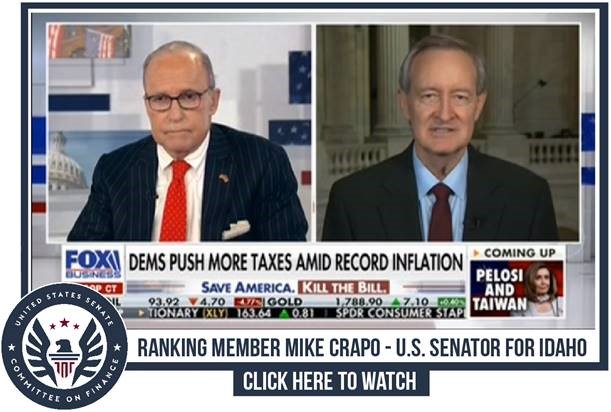Crapo: Damaging Tax Hikes Would Lead to Higher Inflation, Economic Stagnation
“If these taxes are passed, we’ll see higher inflation, more economic stagnation, lower wages, less employment, and most importantly, the burden will be paid by people making less than $400,000.”
Washington, D.C.--In an interview with Larry Kudlow on Fox Business, U.S. Senate Finance Committee Ranking Member Mike Crapo (R-Idaho) discussed the Democrats’ reckless proposals to raise taxes amid high inflation and economic stagnation under the mislabeled “Inflation Reduction Act of 2022.”
Crapo touted the success of Republicans’ 2017 tax reform bill, cautioning that Democrats’ current proposals would undo much of the progress made from those reforms, and highlighted analyses from nonpartisan experts showing the new tax-and-spend bill would raise taxes on low- and middle-income Americans during a period of declining GDP and high inflation; raise taxes on manufacturers, exacerbating supply-chain disruptions, and costing U.S. jobs and investment; and do little to nothing to lower inflation.
2017 tax reform encouraged investment in domestic manufacturing:
“This is exactly what we intended to happen with the 2017 tax act. Recall that back then, we were facing capital fleeing from the United States and we saw a really weak economy. When we incentivized capital to come back to the United States, over a trillion dollars in capital that was being held offshores came back, and we started seeing investment growth in many areas--particularly manufacturing--that is so critical to making our economy stronger again. . . . These taxes will slam that very dynamic.”
Nonpartisan experts confirm tax increases will fall on manufacturing and low- to middle-income taxpayers:
“We just got two analyses from the Joint Tax Committee, a bipartisan committee, that analyzes these dynamics. One of them said where this will fall and the other said who will pay the burden of these taxes.
“The first one said, the burden will fall mostly--49 percent--on manufacturing in the United States, and will still hit all other segments of the economy. The second one said this will fall through to the lower- and middle-income classes primarily.
“Just a couple more statistics: It said in the first year of these new taxes, $17 billion will be paid by people making less than $200,000 a year, and by the end of year ten of these new taxes, one-half to two-thirds of the entire burden of these tax increases will fall on people making less than $400,000. And of course, that number is critical, because that is what President Biden said he would not do.”
The notion that these are tax loopholes is absolutely false:
“People across this country understand that [utilizing the tax code] isn’t bad--they realize these aren’t loopholes, and this is exactly what Congress intended with the research and development tax credits, production tax credits and deductions that were authorized by Congress for this very purpose.
“It grew the economy, grew wages, increased employment and made our economy much stronger with the kind of capital investment that makes us more competitive against China, Russia and malign activities from other nations across the world trying to steal our markets.
“The notion these are tax loopholes is absolutely false. This is exactly what was intended to happen, it is happening and it is having the impact that it should have.
“If these taxes are passed, what we will see is that not only will the burden be carried, by far, by those earning less than $400,000, but it will result in higher inflation, more stagnation of our economic growth, lower wages, less employment and most importantly, as I said, the burden will be paid by people making less than $400,000.”
A direct tax on American energy:
“By the way, we’re talking about this book tax--this corporate minimum tax--and you know there is another specific tax in here that is directly on our oil and gas production, at a time when the President has already shut down American production as much as he can. Gas prices have skyrocketed and they’re talking about piling another tax on the oil and gas industry, it is inexplicable. Their drive for more spending is causing them to ignore all of these arguments because it is the only way they can get to where they can justify the new spending.”
###

